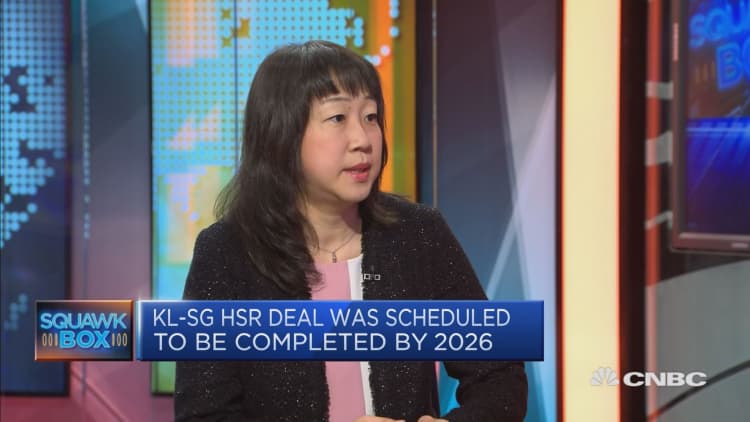Plans to develop a high-speed rail project linking Kuala Lumpur and Singapore have been scuttled and that's likely to dent the potential fortunes of some that had stood to benefit from the massive endeavor.
Malaysia said it was scrapping plans to build a 350-kilometer high-speed rail, costing some $17 billion, that would have by 2026 linked Kuala Lumpur, its capital, with neighboring Singapore. Although Malaysian Prime Minister Mahathir Mohamad had pledged to review investment during his campaign earlier in the year, the railway announcement was relatively sudden, coming on the back of the surprising election outcome last month and years of planning by both countries.
Singapore, however, has yet to receive official word on Malaysia's decision. In a statement on Friday, Singapore's transport minister said the country continued to incur costs as it awaited word from the Malaysian government.
When completed, the high-speed rail was expected to shorten travel time between the two endpoints of the line — which currently takes more than 4 hours to traverse by car — to only 90 minutes.
Even though construction for the project had not yet substantially begun, its cancellation is likely to have an impact on businesses linked to the project.
Builders
Construction and infrastructure players that would have been involved in the railway are among those facing lost revenue opportunities. And given how most of the railway project have been located in Malaysia, companies there stand to lose more than their counterparts in Singapore.
Among the names that stand to lose are Gamuda, a builder, and Malaysian Resources Corporation, an infrastructure and property company, which had been appointed as civil infrastructure project delivery partners for the northern section of the HSR project, as well as YTL, which had been chosen for the southern section of the project.
The companies said in filings to the Malaysian stock exchange last week that they had received notice of the cancellation and that all negotiations were suspended. The three firms did not immediately respond to an emailed request for comment.
Major rail companies that had jockeyed to build, operate and finance the railway may also come away disappointed.
"The Chinese and Japanese consortiums were deemed to be the frontrunners," said Corrine Png, chief executive of Crucial Perspectives, referring to groups led by China Railway Corporation and Japan's JR East that had been linked to the project.
JR East and China Railway did not immediately reply to a request for comment.
Airlines
Malaysia's decision to cancel the project should at least prove to be good news for airlines working the Kuala Lumpur-Singapore route.
"Investors have been discounting that [certain airlines would] lose a lot of traffic to rail when this happens because for the short-haul flights, the economics make sense for passengers to to switch to rail," Png told CNBC's "Squawk Box" after the Malaysian government announced its decision.

Among the names expected to benefit are Jetstar Asia, which counts 10 percent of its traffic from the Kuala Lumpur-Singapore route, as well as AirAsia Group and Singapore Airlines, which see the route contributing to roughly 4 percent of traffic, Png said.
The latter two airlines are also the two largest carriers that cover the route.
Aside from airlines, industries related to the sector, including airports and service providers, are also expected to be beneficiaries. Specifically, the cancellation of the railway would be advantageous for Singapore-listed ground handling firm SATS and line maintenance service provider SIA Engineering, Png said.
Jurong Lake District
Singapore's plans to develop a second major business district — called Jurong Lake District — in the west of the country could also take a knock given how the Singapore high-speed railway terminus was meant to be located there, although analysts said the cancellation was no death knell for the area.
That's mainly because, even though the railway terminal was billed as an integral feature for the Jurong area, other drivers of development, including the upcoming Tuas megaport, could be sufficient engines of growth, Tay Huey Ying, head of research and consultancy at JLL Singapore, told CNBC.
"As multiplier effects [potentially generated by the Jurong East terminus] would come about only after the commencement of the [high-speed rail] originally scheduled for 2026, the impact on existing businesses and developments is minimal," Tay said.
Alice Tan, head of consultancy and research at Knight Frank Singapore, called the railway project "just a bonus" to the area. She added that "with or without" the rail terminus, there are "already a plethora of plans" to develop the second central business district.
Even though Jurong on the whole could get on just fine without the railway, there could be questions for Genting Hotel Jurong. The hotel opened in 2015 and is located within walking distance of where the Singapore Jurong East high-speed railway terminus would have been developed.
Although its 2017 annual report said the property "consistently" performed better than an industry-average occupancy rate of above 90 percent through the year, the company could have been counting on the rail station to boost its future revenues.
A spokesman for another Genting unit told Singapore newspaper The Straits Times in 2015 that the hotel was "well-placed to welcome visitors and commuters from Malaysia and the region" given its proximity to the planned site for the rail terminus.
Genting Singapore declined to comment.
'No bad thing'
The announcement to withdraw from the project comes as Malaysia's new government attempts to reduce government spending.
Malaysian Prime Minister Mahathir said the the project would be cut because it was not beneficial given its cost, which his government estimates to be around 110 billion Malaysian ringgit ($27.6 billion). He had previously told the media that the new administration would be reviewing foreign investments in Malaysia, including those linked to China's Belt and Road Initiative.

"Given Malaysia's weak fiscal position and that some of these projects are of dubious economic value, [canceling some huge infrastructure projects] may be no bad thing," Alex Holmes, Asia economist at Capital Economics, said in a note sent before news of the high-speed rail cancellation.
Although investment growth would likely "drop sharply" if Malaysia began scrapping infrastructure projects, the cancellations could be in the best interests for the country, according to Holmes. Malaysia's economy has been at risk of overheating, given robust growth, and infrastructure projects could worsen the country's fiscal position, Holmes said.

